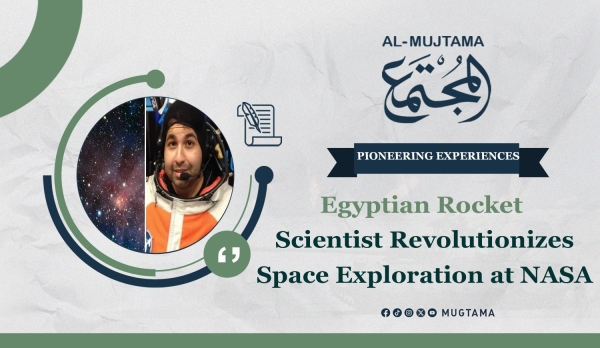Dr. Essam Heggy.. The Egyptian Space Scientist at NASA
Dr. Essam Heggy (45 years old) is an Egyptian-American space scientist working at NASA in the field of rocket science.
Early Life and Education
Essam was born in the Libyan capital, Tripoli, in 1975, where he completed his elementary education. He moved with his father – who worked in the diplomatic corps for the Arab League during its time in Tunisia in the 1980s – to Tunisia, where he earned his middle school diploma. He then returned to Cairo and graduated from Cairo University with a bachelor's degree in astronomy. He subsequently moved to Paris to continue his studies, earning a master’s degree in space science in 1999. In 2002, he obtained the first Egyptian doctoral thesis on planet discovery.
Dr. Heggy has sent several messages to politicians in the Arab world, emphasizing that the success of any political project will not be achieved without a genuine educational component included in that project. He added that constructive ideas aimed at creating a scientific renaissance should not be attacked or criticized. Heggy highlighted the role of education in bridging societal gaps, urging communities to abandon pessimistic attitudes when facing obstacles to any educational project intended to uplift society.
Heggy recalled his experience as a scientific advisor to the presidency, describing the atmosphere of despair surrounding attempts to reform the educational system. He stressed the importance of making education the cornerstone of the Arab revolution to elevate citizens' living standards, explaining the dangers of ignorance on societies. He also emphasized that the path to democracy begins with education.
Among his notable quotes: "Politics isn’t just about power struggles and positions; it affects the everyday life of citizens, and political reform starts with educational reform."
Professional Career
Essam Heggy began his professional career as a teaching assistant at the Faculty of Science at Cairo University in 1997. He then worked as a researcher at the French National Center for Scientific Research (CNRS) in 1999, followed by a teaching position at Cairo University in 2002. Later, he became a researcher at the French Space Agency (CNES), then an assistant professor at the University of Paris. He eventually moved to work at NASA’s space research division in the United States. Additionally, he served as a scientific advisor to the President of Egypt in 2013 for three months before resigning.
Currently, Heggy works at NASA’s Jet Propulsion Laboratory in the radar imaging department, which oversees numerous scientific missions aimed at exploring planets in the solar system.
Essam Heggy is considered a symbol for many young people in Egypt, known for his advocacy for reforming higher education and combating corruption. The Arab League and the American magazine Times Cent Petersburg recognized him as one of the most important intellectual figures in Egypt and the Arab world when he was just 29 years old.
He has received numerous scientific awards for his role in discovering water on Mars and what this means for understanding the evolution of water on Earth, particularly in developing methods to discover water in desert regions.
In 2006, France granted him citizenship in recognition of his distinguished contributions to science.
It is worth noting that Cairo University dismissed Dr. Heggy in 2004 due to his criticism of corruption within the university administration at the time and his protests over incomplete administrative procedures. Despite his scientific achievements, Heggy has not received any official honors in Egypt. He currently resides in Los Angeles, California, in the United States.
Exploring Mars
One of the pioneering scientific missions Heggy participated in involved exploring life on the surface of Mars using ultra-sensitive equipment in Egypt’s Western Desert. This effort aimed to detect water at depths of up to 600 meters. The experiment was a crucial part of preparing for the Phoenix spacecraft mission to Mars, which led to significant scientific discoveries, most notably the presence of ice at its north and south poles. This discovery suggests the possibility of some form of life existing on the planet in the past.
Dr. Heggy explained that the water discovered on Mars is mixed with certain soil minerals, while deep underground water located hundreds of meters below the surface contains noticeable salt levels. He affirmed that the discovery of subsurface water ice on Mars opens doors that remain largely unexplored regarding the nature of the primitive cells from which life may have originated in the distant past.
Read Also: Space Science Brings One Closer to Allah and the Quran
-------------------------------------------------------------


